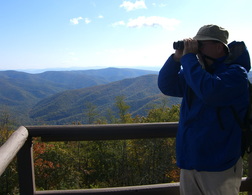
The Virginia Wilderness Committee, a grass-roots group dedicated since 1969 to protecting wild areas in federal national forests from development, has won a grant from the Bama Works Fund of Dave Matthews Band. Administered by the Charlottesville Area Community Foundation, the Bama Works Fund focuses on programs for disadvantaged youth, needs of the disabled, arts and humanities and protection of the environment. Dave Matthews, who has a strong personal interest in wilderness issues, has said “the wild nurtures our souls.”
The Virginia Wilderness Committee will use the grant to develop a collaborative stakeholder process involving hunting, recreation, and conservation groups, adjacent landowners, local business leaders, timber interests, and state and federal agencies. The goal is to reach agreement on protection strategies for special areas in the George Washington National Forest and also encourage the development of early succession habitat on national forest lands suited to this activity.
Located along Virginia’s rugged western border with West Virginia, the George Washington National Forest (GWNF) offers recreational amenities and a scenic destination for millions of people living within a few hours’ drive. Drinking water streams for Washington, D.C., Richmond, VA, and many smaller towns rise in the mountain ranges of the GWNF. Native brook trout and hundreds of other rare and declining wildlife species find habitat there.
The GWNF also overlies parts of the Marcellus shale formation and is under industry pressure to allow hydraulic fracturing, or fracking, for gas. Controversy over fracking includes fear of contamination of drinking water supplies. Concern for future water quality of the many drinking water streams that flow out of the GWNF has stimulated efforts to protect the wildest remaining areas from drilling and other kinds of development. [[QUOTE “We want to keep our last wild areas intact,” said Laura Neale, president of the Virginia Wilderness Committee “ … so future generations will have the chance to both enjoy these resources and learn from them ....”
Located along Virginia’s rugged western border with West Virginia, the George Washington National Forest (GWNF) offers recreational amenities and a scenic destination for millions of people living within a few hours’ drive. Drinking water streams for Washington, D.C., Richmond, VA, and many smaller towns rise in the mountain ranges of the GWNF. Native brook trout and hundreds of other rare and declining wildlife species find habitat there.
The GWNF also overlies parts of the Marcellus shale formation and is under industry pressure to allow hydraulic fracturing, or fracking, for gas. Controversy over fracking includes fear of contamination of drinking water supplies. Concern for future water quality of the many drinking water streams that flow out of the GWNF has stimulated efforts to protect the wildest remaining areas from drilling and other kinds of development. [[QUOTE “We want to keep our last wild areas intact,” said Laura Neale, president of the Virginia Wilderness Committee “ … so future generations will have the chance to both enjoy these resources and learn from them ....”

 RSS Feed
RSS Feed